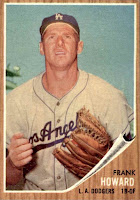Bob Shaw's meandering career had many ups and downs--he was occasionally an ace (down the stretch in 1959 for the White Sox), but more often an enigmatic, Jekyll-and-Hyde type of pitcher who was sometimes simply too hittable for his own good. His season for the Braves in 1962 combined both of these tendencies, and proved that starting pitchers are individualistic enough that their success patterns need to be more carefully examined by baseball insiders.
Shaw's QMAX chart shows the bifurcated nature of his work in '62--we've emphasized the performance gaps based on the bi-directional performance matrix. As you go down the rows, you see hit prevention shift from strength/dominance to vulnerability/weakness. Shaw's '62 season is almost equally split between these performance extremes, and it appears that attempts to use him as a workhorse (with longer outings and fewer days rest) had a negative effect on his ability to sustain his effectiveness across an entire season.
Instead of looking for ways to protect his performance level by giving him extra days off or curtailing his innings per start, the Braves decided to make him a relief pitcher the next season, which only served to make his performance even more erratic. He would be traded to the Giants in 1964, and they would keep him in the bullpen that year, with similar results. The following year they returned him to the starting rotation, and with more attention paid to his workload, Shaw had his last solid year.
On this night (July 18, 1962), Shaw was at his best, snapping a personal five-game losing streak with a brilliant two-hit shutout. Never a big strikeout artist, Shaw fanned five and walked two in completely shutting down the Giants. (His QMAX score in this game: 1, 1--the top box at the far left.) Juan Marichal, still mired in his mid-season slump, surrendered a two-run homer to Lee Maye in the first, and was touched for three more runs in the third. (The loss dropped his season mark to 12-6. His QMAX score for this game: 7, 4.) Final score: Braves 6, Giants 0.
IN Cincinnati, the Dodgers were being similarly baffled by Jim O'Toole through seven innings, managing just two hits off the Reds' lefty. In the bottom of the seventh, Gordy Coleman hit his second homer of the game off Don Drysadale, a two-run shot that gave the Reds a 3-0 lead. The Dodgers finally bunched two hits and a walk off O'Toole in the eighth to score a run, but they trailed 3-1 with two out in the top of the ninth when Tommy Davis hit a grounder to shortstop Roy McMillan, who bobbled it. Frank Howard then came to the plate and hit O'Toole's first pitch for a mammoth opposite-field homer to tie the game.Then Larry Sherry made things "interesting" for the Dodgers. In the bottom of the ninth, he hit two batters in a row to put the potential game-winning run into scoring position, but got out of it when Coleman lined into a double play. In the tenth, he was helped out by ex-Dodger Don Zimmer, who stumbled while running on a 3-2 pitch and was thrown out at second to end the inning.
In the top of the eleventh, O'Toole (still in there!) hit Willie Davis with one out. Willie stole second, and then came home on Tommy Davis' RBI single. Fred Hutchinson then replaced O'Toole with Jim Brosnan, who then gave up another mammoth home run to Frank Howard (this one to dead center). The Dodgers took a 6-3 lead into the bottom of the inning.Sherry then proceeded to give up a single and a double to the first two batters he faced. Walt Alston brought in Ron Perranoski, who proceeded to walk Joe Gaines, loading the bases and bringing the potential winning run to the plate in the form of Vada Pinson (with Frank Robinson on deck). With the Crosley Field crowd bellowing in his ears, Perranoski pitched with intricate care to both Pinson and Robinson, inducing both of them to ground out...which brought in two runs to make it a one-run game. With two outs and the tying run on second, Alston broke a cardinal rule of the game (or so it was so often explained to us back in '62): he put the winning run on base by intentionally walking Gordy Coleman--who, of course, had already hit two homers and a blistering line drive.
Perranoski now faced lefty-swinging Marty Keough, 0-for-4 on the night. Keough took a strike, then launched the next pitch down the right field line with home run distance...but the ball curved foul at the last moment! After fouling off the next pitch, Keough lunged at a low pitch and hit a grounder to Maury Wills, who knocked the ball down, grabbed it barehanded, and had just enough time to toss the ball to Jim Gilliam for the final out, thus extinguishing a game that had seemingly taken on a life of its own. Final score: Dodgers 6, Reds 5 (11 innings).


